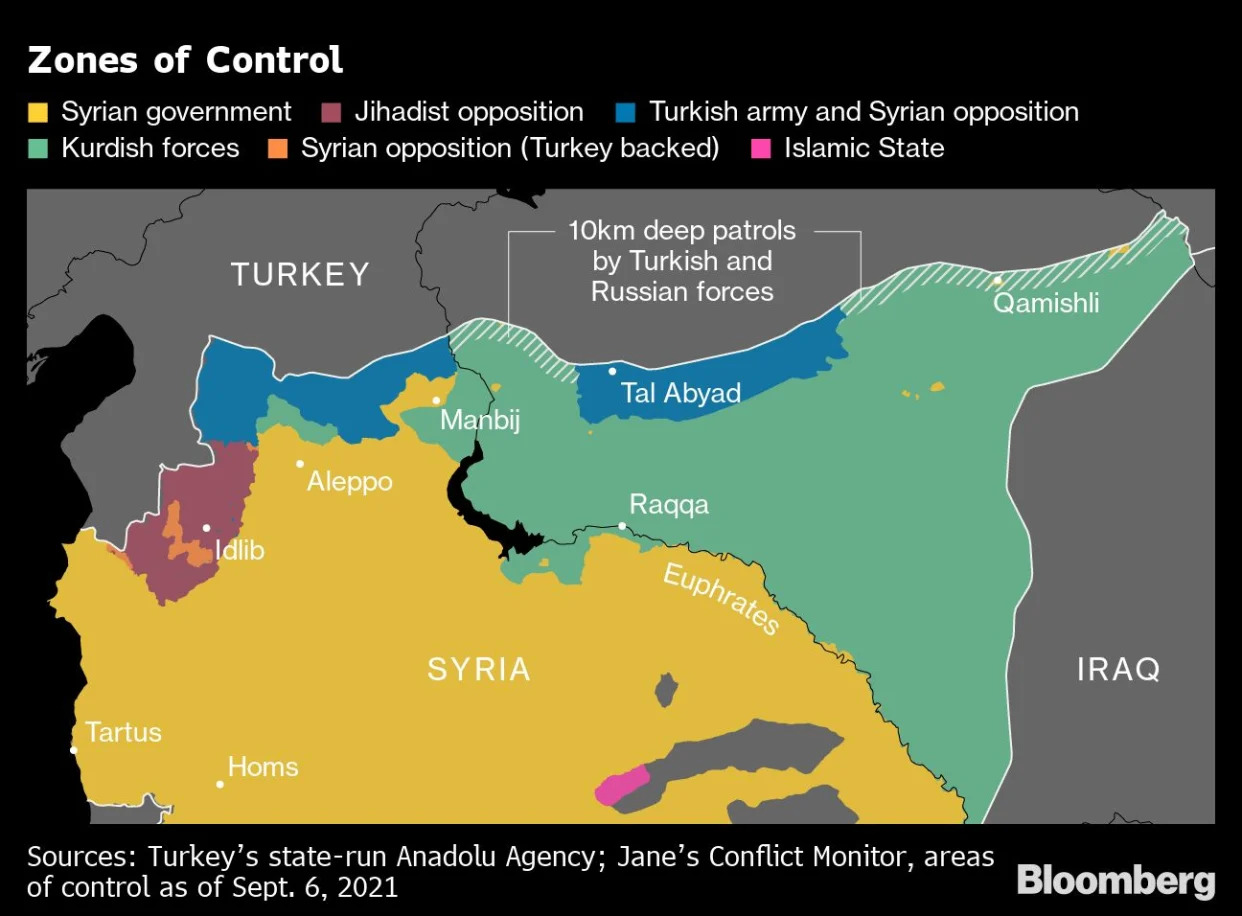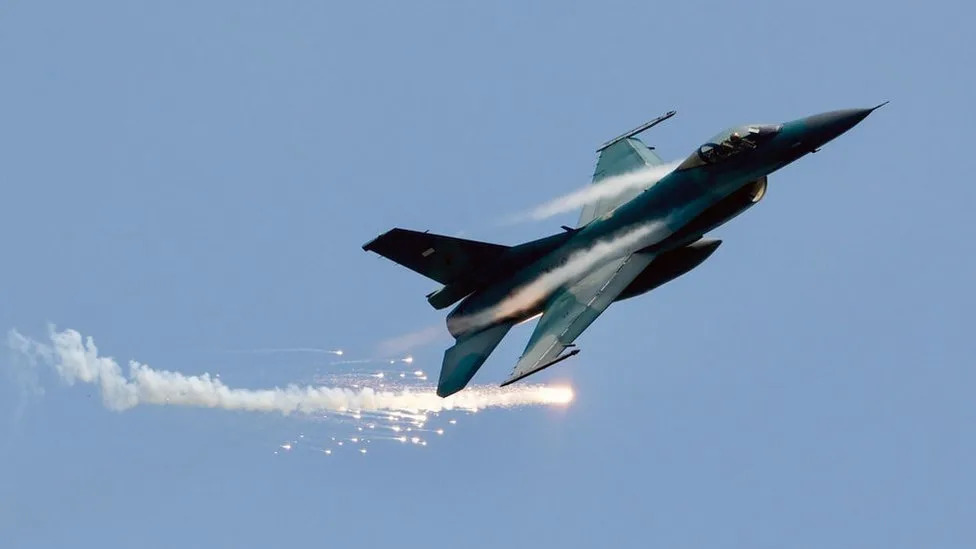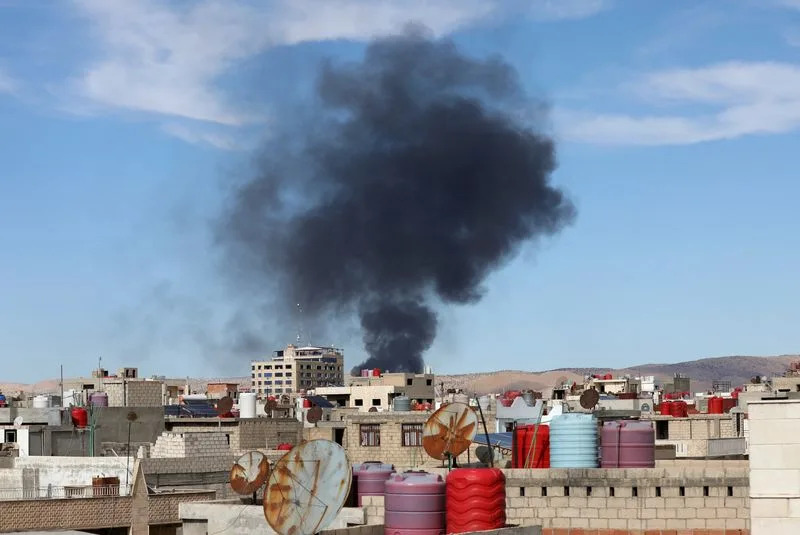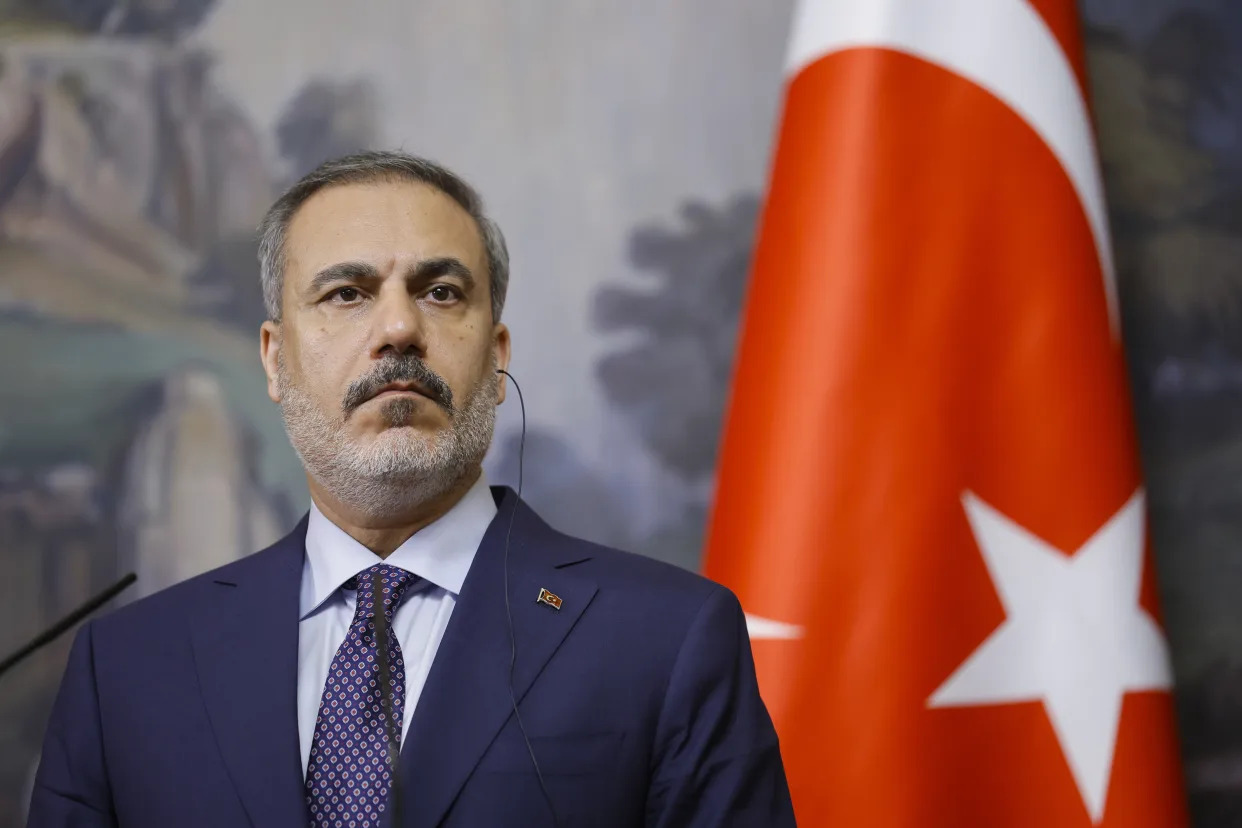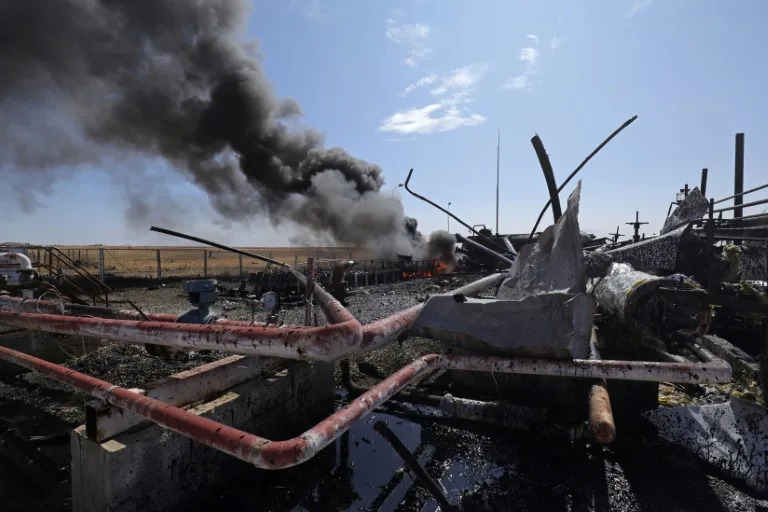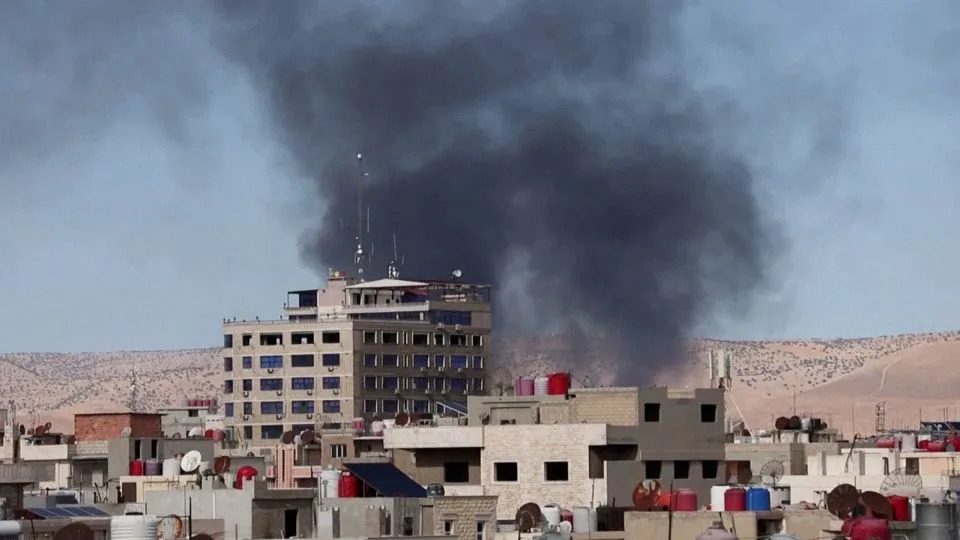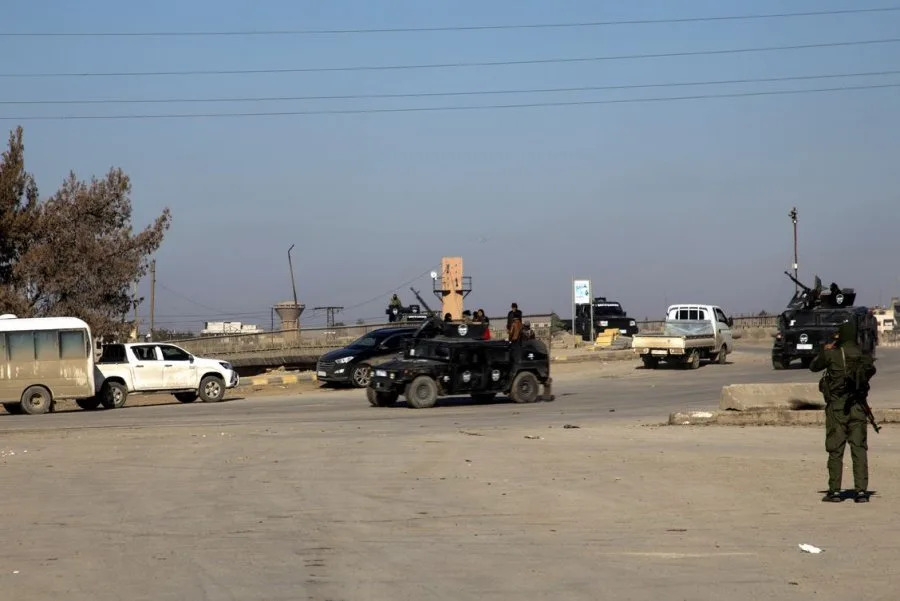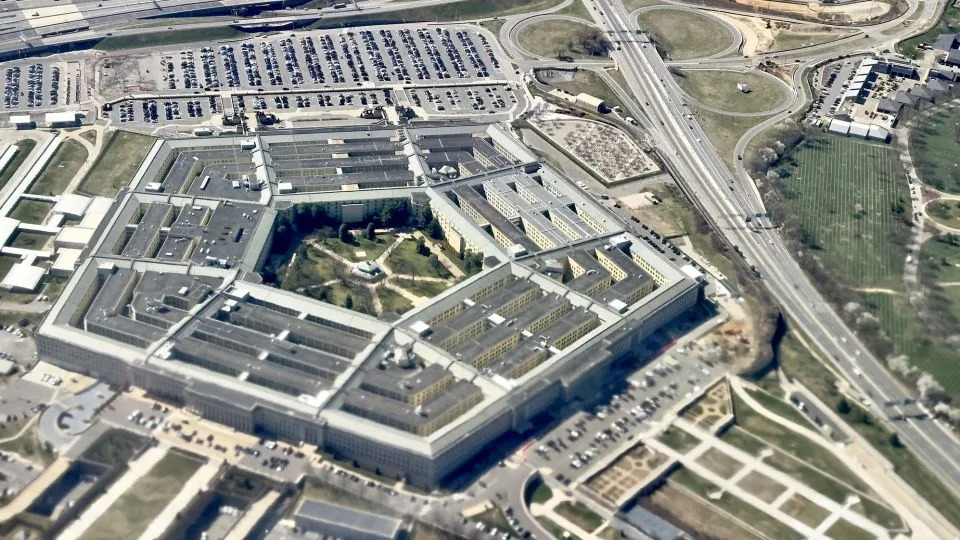2023/05/07

By Aidan Lewis and Sarah El Safty
CAIRO (Reuters) -The Arab League readmitted Syria after more than a decade of suspension on Sunday, consolidating a regional push to normalise ties with President Bashar al-Assad.
The decision said Syria could resume its participation in Arab League meetings immediately, while calling for a resolution of the crisis resulting from Syria's civil war, including the flight of refugees to neighbouring countries and drug smuggling across the region.
While Arab states including the United Arab Emirates have pushed for Syria and Assad's rehabilitation, others, including Qatar, have remained opposed to full normalisation without a political solution to the Syrian conflict.
Some have been keen to set conditions for Syria's return, with Jordan's foreign minister saying last week that the Arab League's reacceptance of Syria, which remains under Western sanctions, would only be the start of "a very long and difficult and challenging process".
"The reinstatement of Syria does not mean normalisation of relations between Arab countries and Syria," Arab League Secretary-General Ahmed Aboul Gheit told a press conference in Cairo on Sunday. "This is a sovereign decision for each country to make."
A Jordanian official said Syria would need to show it was serious about reaching a political solution, since this would be a pre-condition to lobbying for any lifting of Western sanctions, a crucial step for funding reconstruction.
CAPTAGON
Sunday's decision said Jordan, Saudi Arabia, Iraq, Lebanon, Egypt and the Arab League's Secretary General would form a ministerial group to liaise with the Syrian government and seek solutions to the crisis through recipocral steps.
Practical measures included continuing efforts to facilitate the delivery of aid in Syria, according to a copy of the decision seen by Reuters.
Syria's readmission follows a Jordanian initiative laying out a roadmap for ending Syria's conflict that includes addressing the issues of refugees, missing detainees, drug smuggling and Iranian militias in Syria.
Jordan is both a destination and a main transit route to the oil-rich Gulf countries for captagon, a highly-addictive amphetamine produced in Syria.
Syria's membership of the Arab League was suspended in 2011 after the crackdown on street protests against Assad that led to the civil war. Several Gulf states including Saudi Arabia began backing rebel groups fighting to oust Assad from power.
Assad later regained control over much of Syria with the help of his main allies Iran and Russia, but the war cost hundreds of thousands of lives and led millions to flee the country. Syria remains splintered with its economy in ruins.
Recently, Arab states have been trying to reach consensus on whether to invite Assad to an Arab League summit on May 19 in Riyadh to discuss the pace and conditions for normalising ties.
Responding to a question over whether Assad could participate, Aboul Gheit told reporters: "If he wishes, because Syria, starting from this evening, is a full member of the Arab League."
"When the invitation is sent by the host country, the Kingdom of Saudi Arabia, and if he wishes to participate, he will participate," he added.
Saudi Arabia long resisted restoring relations with Assad but said after its recent rapprochement with Iran - Syria's key regional ally - that a new approach was needed with Damascus.
Washington, which terms Assad's Syria a "rogue" state, has urged Arab states to get something in return for engaging with Assad.
(Additional reporting by Hatem Maher and Nayera Abdallah in Cairo and Suleiman al-Khalidi in Amman Editing by Mike Harrison, Frances Kerry and Angus MacSwan)




© Reuters
The country is poised for a triumphant return this month at the league’s next summit — perhaps represented by President Bashar al-Assad, the Syrian leader accused of committing war crimes against his own people.

By Vivian Yee
May 7, 2023
Arab nations agreed on Sunday to allow Syria to rejoin the Arab League, taking a crucial step toward ending the country’s international ostracism more than a decade after it was suspended from the group over its use of ruthless force against its own people.
When Syria’s neighbors and peers ejected it from the 22-member league in November 2011, months after its Arab Spring uprising began, the move was seen as a key condemnation of a government that had bombed, gassed and tortured protesters and others in a conflict that metastasized into a long civil war.
Now, the region is normalizing relations, increasingly convinced that Arab countries are gaining little from isolating Syria, as the United States has urged them to. Refusing to deal with Syria means ignoring the reality that its government has all but won the war, proponents of engagement argue.
That leaves Syria poised for a triumphant return this month in Saudi Arabia at the Arab League’s next summit — perhaps represented by President Bashar al-Assad, the Syrian leader accused of committing war crimes against his own people over the past decade. Syria’s rehabilitation could unlock billions of dollars in reconstruction projects and other investments for its tottering economy, further propping up Mr. al-Assad
The circumstances that led to Syria’s suspension have not changed; if anything, the bloodshed has only grown during the civil war that has consumed the country for the past 12 years, leaving Mr. al-Assad in power at home but a pariah nearly everywhere else.
Hundreds of thousands of Syrians have died since the fighting broke out, and more than 14 million have fled their homes for other parts of Syria, neighboring countries or beyond, according to United Nations estimates.
“Today, Arab states have put their own cynical realpolitik and diplomatic agendas above basic humanity,” said Laila Kiki, the executive director of the Syria Campaign, a nonprofit organization that supports Syrian civil society groups.
“By choosing to restore the Syrian regime’s membership of the Arab League, member states have cruelly betrayed tens of thousands of victims of the regime’s war crimes and granted Assad a green light to continue committing horrific crimes with impunity.”

Revulsion at Mr. al-Assad’s actions, along with pressure from the United States, had left most of Syria’s Arab neighbors reluctant to engage with the government over the past decade. A few had openly supported the opposition fighting to topple Mr. al-Assad, and some remain loath to embrace him.
But the regional calculus has shifted. With the Syrian government in Damascus having retaken most of the country from opposition forces, it has been obvious for years that Mr. al-Assad is here to stay.
Deadly Quake in Turkey and SyriaA 7.8-magnitude earthquake on Feb. 6, with its epicenter in Gaziantep, Turkey, has become one of the deadliest natural disasters of the century.Families of the Missing: In the aftermath of the tragedy, with many victims still unaccounted for, the Turkish authorities turned to fingerprints, DNA tests and photographs to link unidentified bodies with their next of kin.In Antakya: About 3,100 buildings collapsed in the city, killing more than 20,000 people. The damage is so profound that 80 percent of the structures still standing may need to be demolished.Builders Under Scrutiny: The deadly quake has raised painful questions over who is to blame for shoddy construction and whether better building standards could have saved lives.Needless Deaths: Middle-class landowners in Turkey got wealthy off a construction system rife with patronage. Our investigation reveals just how fatally shaky that system was.
Neighboring countries including Lebanon and Jordan have been eager to work with Syria on sending refugees who fled there back home, while others hope to cooperate on efforts to stop the trade of Captagon, an illegal, addictive drug that the Syrian government has produced and sold as sanctions have bitten and its economy has cratered.
The leading Middle Eastern power brokers, Saudi Arabia and the United Arab Emirates, were also looking for a new approach to dealing with Iran, which wields deep influence in Syria after sending fighters and other aid to help Mr. al-Assad cling to power. Deciding that regional isolation had only driven Syria into the arms of Iran, the Gulf monarchies now hope to peel Mr. al-Assad away from Tehran by engaging with him.
An early sign of where things were heading came when the Emirates normalized relations with Damascus in 2018. But the slow-burn movement to restore diplomatic and economic relations with Mr. al-Assad gathered momentum in recent months, after a major earthquake in February killed more than 8,000 people in northern Syria, opening the door for Arab countries to reach out.

Soon, planeloads of aid from Syria’s Arab brethren were landing in quake-affected areas, and Egypt dispatched its foreign minister to meet with Mr. al-Assad in Damascus. By mid-April, Tunisia had re-established diplomatic relations with Syria and Saudi Arabia had welcomed Syria’s foreign minister to Jeddah to discuss restoring ties.
After years of deep freeze, the Saudi-Syrian relationship has moved quickly in recent months as Saudi Arabia, wielding its regional clout, pushed other Arab countries toward normalization, as well. It appeared to be the main player fast-tracking Syria’s rehabilitation ahead of the Arab League summit in Jeddah on May 19, though Oman and the U.A.E. had been advocating the same for years, diplomats said.
The Arab rush to welcome Damascus back into the fold happened despite public objections from the United States, which imposed strong sanctions on Syria after its civil war began and has shown no inclination to lift them, still hoping to isolate Syria over its government’s brutality. But American efforts at easing Mr. al-Assad out and replacing him with an inclusive, democratic government have gone nowhere, leaving American officials on the sidelines.
On Twitter on Friday, two days before the Arab League meeting, Secretary of State Antony J. Blinken reiterated that the United States continued to oppose normalization with Syria. A peaceful political transition that would eventually replace Mr. al-Assad through elections was “the only viable solution to ending the conflict,” he said.
Realizing they cannot stop Arab allies from restoring ties, U.S. officials have urged them to try to exact a price from Mr. al-Assad in exchange, whether it is guaranteeing the safe return of Syrian refugees, cracking down on the Captagon trade or reducing Iran’s military presence in Syria. The Arab League’s assistant secretary general, Hossam Zaki, said on Sunday that the league had formed a committee to discuss such conditions.
But renewed membership in the group, at least, was a done deal.

“Having Syria out of the league wasn’t useful, either to Syria or to the Arabs,” Bassam Abu Abdallah, a Damascus-based political analyst, said on Sunday, describing the decision as “very positive.”
American efforts to drive Mr. al-Assad from power had failed, he said, adding, “The U.S. political elite should abandon the mentality of regime change.”
Many of the countries in the Arab League have not yet formally re-established diplomatic relations with Syria and could still put further conditions on doing so. They include Egypt, a traditional Arab heavyweight that remains more hesitant about embracing Mr. al-Assad than its Gulf allies.
But readmitting Syria to the Arab League is a powerful statement, setting the stage for individual members to restore ties.
Even if some members were steaming ahead on their own, “normalization isn’t complete until they come to this building,” Ahmed Aboul Gheit, the Arab League’s secretary general, said in a recent interview.
Hwaida Saad contributed reporting from Beirut, Lebanon, and Vivian Nereim from Riyadh, Saudi Arabia.
Syria’s Assad Uses Disaster Diplomacy to Inch Back Onto World Stage
Feb. 16, 2023
Vivian Yee is the Cairo bureau chief, covering politics, society and culture in the Middle East and North Africa. She was previously based in Beirut, Lebanon, and in New York, where she wrote about New York City, New York politics and immigration. @VivianHYee



